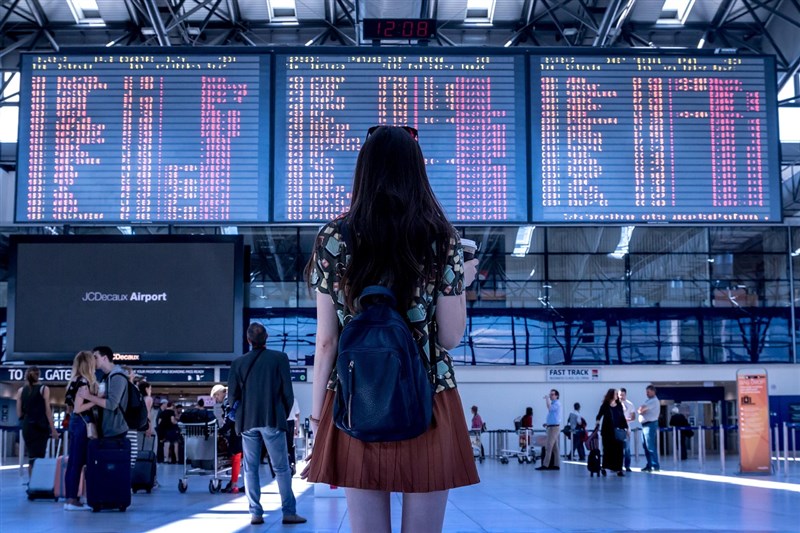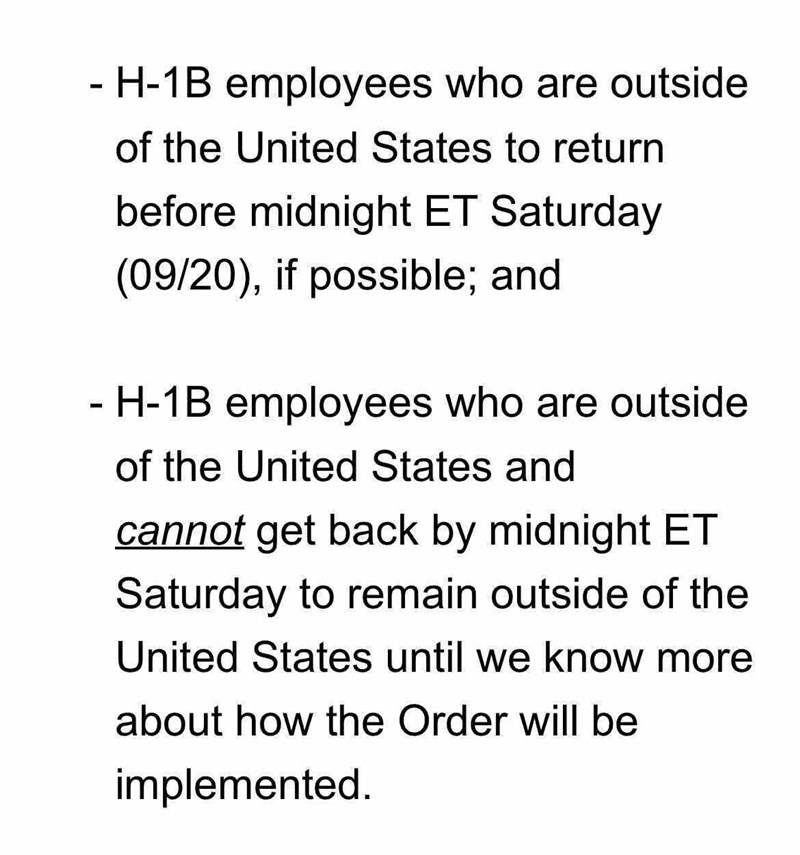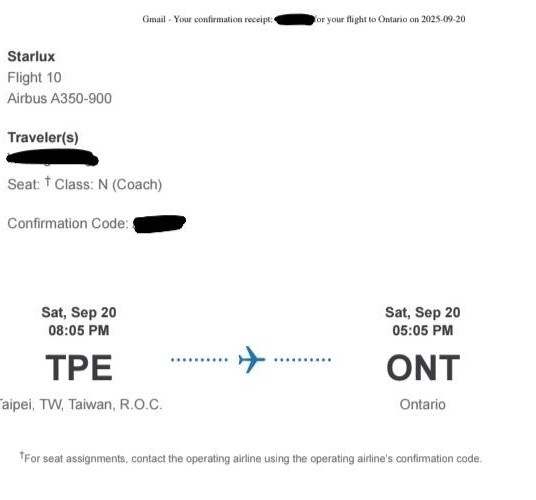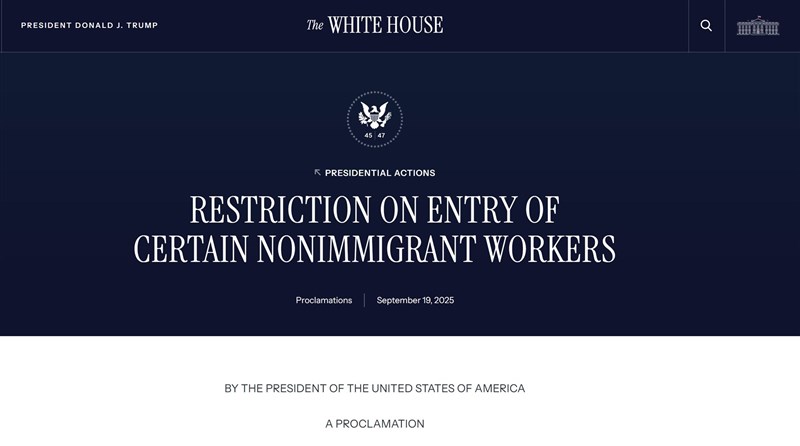
Taipei, Sept. 28 (CNA) A Taiwanese data analyst who works in Pennsylvania surnamed Ko (柯) was enjoying a vacation in Taiwan when the unthinkable occurred.
On Sept. 19 (U.S. time), the United States government announced that after 12:01 a.m. Sept. 21 Eastern time, the fee for an H-1B worker visa, which enables foreign workers to stay in the U.S., would be increased to a massive US$100,000.
That would be up from the US$2,000 to US$5,000 per H-1B visa petition employers had been paying, according to the American Immigration Council.
Ko, who relies on an H-1B visa to remain in the U.S., told CNA he was dining with college friends in Taipei when he received the news, setting off a frantic 24 hours.
With several large U.S. employers advising employees on H-1B visas to get back to the U.S. by Sept. 20 at midnight, Ko desperately sought to beat the deadline.

His friend immediately drove him to Taichung to pick up luggage his family had packed for him in Changhua County. He then headed back north to Taoyuan International Airport and boarded the earliest flight back to the U.S. on the night of Sept. 20.
He only found out in midair that existing visa holders would be exempt from the hefty fee, he wrote in a social media post after arriving in San Francisco.
"Six years in the U.S., I had never felt so helpless as a forever foreigner," Ko said.
Specific group of Taiwanese affected
When the policy was initially announced, most of the attention turned to its impact on Indian and Chinese workers in the U.S., the two biggest beneficiaries of the program.
In the U.S. government's fiscal 2024 (Oct. 1, 2023 to Sept. 30, 2024), 283,397 Indian nationals had H-1B petitions approved (both first-time and renewals), accounting for 71 percent of the total, according to an April 2025 U.S. Citizenship and Immigration Services (USCIS) report.
A total of 46,680 Chinese nationals had petitions approved, or 11.7 percent of the total.
For other countries, including Taiwan, the impact appeared less consequential. Taiwanese had 3,099 H-1B visa petitions approved in FY 2024, of which 1,854 were for new employment.
Yet for those Taiwanese, the whirlwind created by the new policy was very real.
Richard, a Taiwanese data engineer who works in Boston, also took the earliest flight back to the U.S. after receiving an email from his company.

He said H-1B holders rushed back because U.S. employment contracts operate based on "at-will employment," allowing either party to terminate the contract at any time.
With only 48 hours between the announcement and enforcement of the new regulation, "H-1B visa holders faced a high risk of losing their jobs under any circumstances," Richard said.
A day after the Trump administration's initial announcement, it clarified that the US$100,000 fee would be a one-time payment and apply only to new H-1B visa petitions rather than to current H-1B visa holders and those seeking renewals.

That meant Ko, Richard and others in similar positions could breathe a sigh of relief. But the new policy could deal a serious blow to a specific group of Taiwanese: students in the United States who want to work there after graduating.
For most of them, the H-1B is an essential step toward applying for a green card, Richard said.
Most companies were reluctant to sponsor H-1B visas even before the new draconian fee, given the expense, time, and uncertainties involved. Both Richard and Ko submitted more than 700 résumés before receiving offers.
Even with a company sponsorship, foreign workers must pass through a lottery system. In the latest round, 339,000 people applied for 120,141 spots, the report said.
Dim future
Eugene Chen(陳威宇), managing attorney of Eugene Chen Law in the U.S., cautioned, however, that as tech companies are expected to seek injunctions, the regulation might not be final.
Immigration attorney Cecilia Hu (胡芮萍), a member of the American Immigration Lawyers Association, suggested the policy may even give Taiwanese students in the U.S. an edge, depending on how the situation plays out.
She said its focus on "aliens' entry" -- which could imply that the fee would only be applied to foreign workers being brought in from overseas -- may mean that companies hiring U.S.-based international students won't face the $100,000 fee.

If foreign applications drop significantly, U.S.-based international students might have better lottery odds, she said.
There is also a downside, Hu said, as more HR departments inquire about the risks of hiring H-1B workers.
"They might become more conservative about H-1B workers, creating a tougher path for international students."
Luo Tz-yuan, an information engineering master's student at Northeastern University Oakland, told CNA that many of his classmates were shocked and worried about their prospects of staying in the U.S.
Hsieh (謝), a Bay Area-based Taiwanese engineer, worried about the plight of Taiwanese students in the U.S.
"They have been born at the worst of times," he said. "There's already the AI replacement crisis, and now visa issues are adding up."
Though Ko is safe for the time being, the chaos he faced has left him considering work in Canada, Singapore or Japan.
"I'm pessimistic about the future - U.S. companies will prefer outsourcing jobs overseas rather than creating an immigration-friendly environment," he said.
-
Politics
Taiwan's Navy to decommission WWII-era tank landing ship
02/23/2026 02:21 PM -
Business
Taiwan shares close up 0.5%
02/23/2026 01:56 PM -
Sports
Taiwan team concludes Winter Olympics with Sophia Velicer as flag bearer
02/23/2026 12:12 PM -
Business
U.S. dollar down in Taipei trading
02/23/2026 10:19 AM -
Society
Taiwan headline news
02/23/2026 10:00 AM